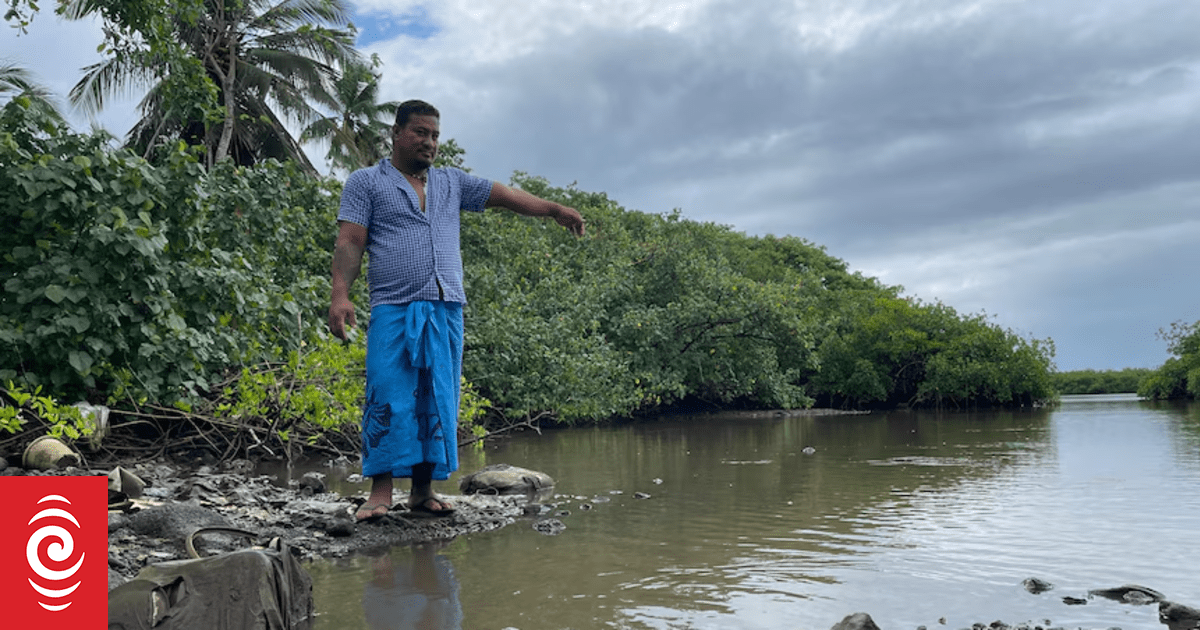By Adel Fruean, ABC Samoa reporter and Pacific Local Journalism Network’s Nick Sas

Tavita Pili says he can smell the fuel from the sunk ship and the tides bring it to shore.
Photo: ABC News: Adel Fruean
Tavita Pili can’t see the ship, but he can smell it.
Standing on rocks on the outskirts of his home village of Tafitoala, Samoa, Mr Pili points to the spot where the diesel comes in, at the back of the village, hidden by mangroves.
It’s about a kilometre or two from where it happened; what villagers are now calling “the incident”.
Thursday marks two months to the day since the Royal New Zealand Navy vessel Manawanui ran aground and sank off the coast of Tafitoala.
And two months on, local villagers say they still have no answers.
“We are worried,” he said.
“We can still smell the fuel and even see it come in with the tides.”
In an event that stunned the New Zealand public, the sinking of the Manawanui in October – one of only nine ships in New Zealand’s navy – was the first the country has lost at sea since World War II.
Last week, the preliminary findings of a military court of inquiry into the sinking were revealed.
It found the crew failed to disengage the autopilot and neglected proper manual control checks, leading to the grounding and sinking.

Mulipola Lulio says they feel like they’ve been forgotten.
Photo: ABC News: Adel Fruean
But on the ground in Samoa, they are less worried about the cause and more concerned about environmental impacts – and when they can fish again.
“It’s been [two months] and our village is still waiting,” local fisherman Mulipola Lulio told the ABC.
“We are sad because it seems that we are being ignored and no one seems to worry about the sufferings our village is going through.”
Villagers say pleas ‘unanswered’
The area surrounding the ship remains an exclusion zone, meaning no one is permitted to fish or swim.
In the weeks after the incident, Samoa’s government said it believed about 200,000 litres of diesel had spilled from the Manawanui. But the New Zealand government has since questioned that number, labelling the leak “a trickle”.
This week, New Zealand’s government confirmed to the ABC that “all going well” with weather and sea conditions, the removal of “fuel and other pollutants on board the Manawanui” would begin “this month”.
In response to questions from the ABC, it said a “small leak” emerging from an engine room vent had resulted in a “light sheen of commercial diesel, which is evaporating on the surface”.
It said there was no evidence of contamination on the shoreline and navy divers and drones were monitoring the situation.
“The main fuel tanks accessible for assessment remain intact, and there is no evidence of any leaks from these,” a spokesperson said.
“Our focus is on ensuring any potential environmental impacts are quickly identified and swiftly addressed.”

It’s quiet on the water, as fishing and swimming is still banned.
Photo: ABC News: Adel Fruean
Yet, despite the New Zealand government’s assurances, villages in the area are adamant that they can still smell diesel and see it running ashore.
And local residents say despite letters and pleas, their calls for compensation over loss of revenue and impacts on their livelihoods remain unanswered.
Former Samoan MP and local resident Tuia Pu’a Leota said the communities affected were now considering legal action.
“Our voices are soft and our approach in regard to our mission is about being respectful,” he said.
“But if things remain the same, we will make a little noise because if we can’t make a little noise they won’t hear us.
“But if we finish making a little noise and still nothing, then we will look at the laws such as international law if there is anything that relates to our situation.”

Tuia Pu’a Leota and his fellow community members have started a committee to try to get answers.
Photo: ABC News: Adel Fruean
The Samoan government did not respond to the ABC’s requests for comment.
The New Zealand government said it was committed to “doing the right thing” but would not comment on the calls for compensation or if the ship would eventually be removed altogether.
“The next steps in the salvage operation after the fuel has been removed are being worked through with the Samoan government and we are not in a position to comment further on this.”
For Tavita Pili it’s simple – he just wants to fish again.
“We have no means to get food or income,” he said.
“We are deeply saddened … we are sad because it seems that we are being ignored.
“From the beginning there should have been some form of assistance to help us cope with the impacts.”
– ABC

